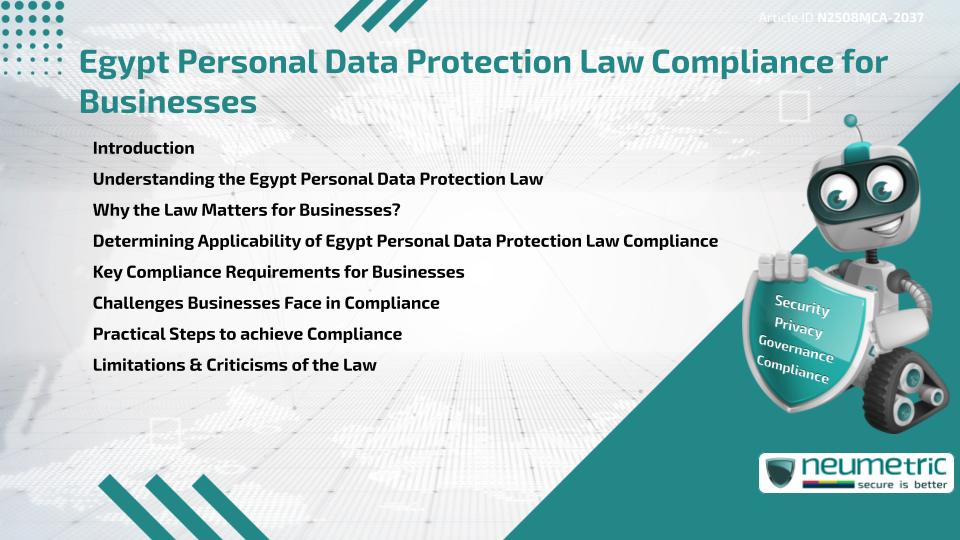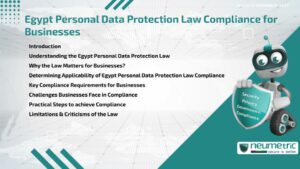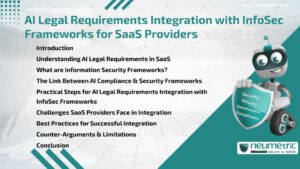Table of Contents
ToggleIntroduction
Egypt has enacted the Personal Data Protection Law [Law No. 151 of 2020], a landmark Regulation that establishes Privacy rights for individuals & Compliance obligations for businesses. It requires Organisations to protect Personal Data, ensure lawful processing & implement safeguards against misuse. Given its broad scope, Egypt Personal Data Protection Law Compliance is essential for businesses across sectors, whether domestic or international.
This article examines the fundamentals of the Law, its applicability to businesses, Compliance obligations, challenges & criticisms. It also offers practical steps for Organisations seeking to align with regulatory requirements while building Customer Trust.
Understanding the Egypt Personal Data Protection Law
The Egypt Personal Data Protection Law, enacted in 2020, is modeled in part on the European General Data Protection Regulation [GDPR]. It sets out rules for the collection, processing, storage & transfer of Personal Data within Egypt.
Key elements include:
- Establishing Consent as a Legal basis for data processing.
- Protecting Sensitive Data, including Health, Financial & Biometric information.
- Restricting Cross-Border Data Transfers without regulatory approval.
- Establishing the Personal Data Protection Center as the Supervisory Authority.
Why the Law Matters for Businesses?
Businesses increasingly rely on Personal Data for operations, Marketing & Digital Services. Compliance with the Law is not optional-it is a legal obligation backed by fines & penalties for violations.
Beyond legal enforcement, compliance strengthens Customer Trust & competitive advantage. Just as GDPR Compliance became a global benchmark for Data Privacy, Egypt Personal Data Protection Law Compliance ensures that businesses meet local expectations while aligning with international standards.
Determining Applicability of Egypt Personal Data Protection Law Compliance
The Law applies to any entity-Public or Private-that processes Personal Data of individuals within Egypt. Applicability depends on:
- Location of Data Subjects: If Personal Data of Egyptian citizens or residents is processed, the Law applies.
- Processing Activities: Collecting, storing, analysing or transferring data all fall under its scope.
- Cross-Border Services: Businesses offering Digital Services in Egypt must comply even without physical presence.
This extraterritorial scope is similar to GDPR.
Key Compliance Requirements for Businesses
For Egypt Personal Data Protection Law Compliance, businesses must implement several measures:
- Obtain clear & informed Consent before processing Personal Data.
- Appoint a Data Protection Officer [DPO] for oversight & Regulatory Communication.
- Register with the Personal Data Protection Center to conduct data-related activities.
- Secure Technical & Organisational Safeguards for Data Storage & Transfer.
- Notify the Authority & Individuals in case of Data Breaches.
- Seek Regulatory Approval before transferring data outside Egypt.
Challenges Businesses Face in Compliance
Businesses encounter a number of difficulties in meeting Compliance Requirements:
- Complexity of Provisions: Understanding legal definitions of Personal Data & Sensitive Data can be challenging.
- Cost of Implementation: Appointing a DPO, investing in Data Security & obtaining approvals increase expenses.
- Operational Disruptions: Strict Cross-Border restrictions may affect multinational companies.
- Awareness Gap: Many Small & Medium Enterprises may lack awareness of their obligations.
Practical Steps to achieve Compliance
To align with Egypt Personal Data Protection law compliance, businesses can adopt practical measures:
- Conduct a Data Inventory & classify Personal Data.
- Develop Privacy Policies & obtain explicit User Consent.
- Train Employees on Data Protection practices.
- Establish Breach Notification procedures.
- Engage Legal & Technical experts for ongoing Compliance monitoring.
- Build Internal Governance Structures to ensure Accountability.
Limitations & Criticisms of the Law
While the Law is a step forward in protecting Personal Data, it faces criticisms:
- Regulatory Burden: Businesses argue that Compliance Requirements may overwhelm smaller firms.
- Cross-Border Restrictions: Limitations on international transfers may hinder global operations.
- Enforcement Questions: Effective enforcement depends on the capacity & independence of the Supervisory Authority.
Despite these criticisms, many experts highlight that strong Privacy protections can enhance consumer trust & digital growth in Egypt.
Conclusion
Egypt Personal Data Protection Law Compliance is a critical issue for businesses. By regulating how Personal Data is collected, processed & transferred, the Law ensures greater Accountability & Protection for individuals. Though Compliance presents challenges, businesses that invest in Privacy Governance gain trust, reduce legal Risks & align with International Standards.
Takeaways
- The Egypt Personal Data Protection Law applies to all entities processing Personal Data of individuals in Egypt.
- Consent, Registration & Data Security are key Compliance Requirements.
- The Law restricts Cross-Border Data Transfers without approval.
- Compliance requires resources & training but enhances Customer Trust.
- Early adoption of Compliance measures strengthens regulatory alignment.
FAQ
What is the Egypt Personal Data Protection Law?
It is a national Privacy law enacted in 2020 that governs collection, processing, storage & transfer of Personal Data.
Does the Law apply to foreign companies?
Yes, it applies to businesses offering Digital Services to individuals in Egypt, even without a physical presence.
Are there penalties for non-compliance?
Yes, violations may result in administrative fines, legal penalties & reputational damage.
How does the Law compare to GDPR?
Both laws share principles such as Consent, Accountability & Data Subject Rights, though Egypt’s Law has stricter transfer restrictions.
Do businesses need to register with an Authority?
Yes, businesses must register with the Personal Data Protection Center before conducting data-related activities.
Can data be transferred outside Egypt?
Yes, but only with prior Regulatory Approval, ensuring protection standards are maintained.
Need help for Security, Privacy, Governance & VAPT?
Neumetric provides organisations the necessary help to achieve their Cybersecurity, Compliance, Governance, Privacy, Certifications & Pentesting needs.
Organisations & Businesses, specifically those which provide SaaS & AI Solutions in the Fintech, BFSI & other regulated sectors, usually need a Cybersecurity Partner for meeting & maintaining the ongoing Security & Privacy needs & requirements of their Enterprise Clients & Privacy conscious Customers.
SOC 2, ISO 27001, ISO 42001, NIST, HIPAA, HECVAT, EU GDPR are some of the Frameworks that are served by Fusion – a SaaS, multimodular, multitenant, centralised, automated, Cybersecurity & Compliance Management system.
Neumetric also provides Expert Services for technical security which covers VAPT for Web Applications, APIs, iOS & Android Mobile Apps, Security Testing for AWS & other Cloud Environments & Cloud Infrastructure & other similar scopes.
Reach out to us by Email or filling out the Contact Form…





